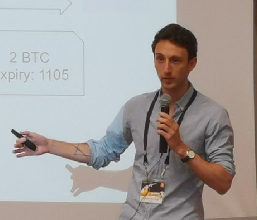3 Questions To Bastien Teinturier
- Justin Mailfait
- May 26, 2020
- 3 min read
Updated: Oct 9, 2020
3 Questions To… Bastien Teinturier, a distributed-systems engineer specialized in decentralized networks and cryptographic protocols. He worked as a software developer at Microsoft France for more than 5 years before joining the French fintech Stratumn, where his activity as a backend protocol engineer focused on decentralized Peer-to-Peer networks, consensus protocols and cryptography.
In 2019 Bastien joined ACINQ, one of the leading companies building the Lightning Network, a scalable instant payment network for the Bitcoin blockchain.

1.
What makes Bitcoin such an interesting project?
Bitcoin is a game-changer for society. We usually aren't lucky enough to witness multiple positive black swans in one generation's lifetime. I used to think the invention of the internet was ours, and we could only hope for smaller achievements after that. But Bitcoin proved me wrong. It took me a lot of time to really grasp what it meant, and the opportunities it created. Bitcoin is an opportunity to reinvent sound money.
"We tend to think that money as we know it today cannot be changed. We take it for granted."
Money is essential to our societies, but have you ever stopped to think about what money is? What properties "good" money needs to have? To learn the history of a few millennia of money experiments, how it evolved, why it had to change? And to wonder: can we improve what we have today? Would it lead to a better society?
We tend to think that money as we know it today cannot be changed. We take it for granted. But if we look back, the incarnation of money we're using is just an experiment that started in 1944, when the Bretton-Woods agreements were signed. It's a young experiment, we still have a lot to learn from it, but most importantly, we must acknowledge some of its failures and limitations, and continue experimenting.
Henry Ford famously said: "It is well enough that people of the nation do not understand our banking and monetary system, for if they did, I believe there would be a revolution before tomorrow morning". When Ford said that, we didn't have the internet. Now we do, and more and more people are starting to understand this banking and monetary system. I'd like to avoid the revolution part, and I think Bitcoin is a great opportunity to correct that.
2.
Bitcoin, The Blockchain™, which is the real innovation?
The last decade has seen so many blockchain projects pop up it's hard to keep track. Most of them were get-rich-quick scams, some of them just well-intentioned wishful thinking. A decentralized blockchain is a very inefficient and limited tool; it will not make hard problems magically go away (remember the "just add AI to it" hype?).
"Thanks to the fear of missing out experienced by many industry behemoths, a lot of money has been injected into "blockchain research"."
A blockchain only makes sense for digital-only assets that hold enough value to justify the cost of securing a distributed ledger. The only use-case for it that has gone past the prototype phase is digital money.
I'm not saying that all the research happening in this space isn't useful though. Thanks to the fear of missing out experienced by many industry behemoths, a lot of money has been injected into "blockchain research". This research has led to several breakthroughs in various branches of cryptography, consensus algorithms and language design that will be useful to Bitcoin and the computer science industry as a whole.
3.
The road ahead.
There are a great many challenges ahead for Bitcoin. Bitcoin, just like fiat money, is an experiment. Bitcoin price is unpredictable. Bitcoin doesn't scale easily. Bitcoin's privacy helps criminals and black markets. But Bitcoin's privacy also helps people in totalitarian regimes evade mass surveillance. Bitcoin provides financial freedom. Bitcoin is digital cash. Bitcoin is digital gold. Bitcoin needs to be regulated. Bitcoin can't be regulated. Bitcoin must be stopped. Bitcoin can't be stopped.
Bitcoin raises so many interesting topics that our globalized world needs to acknowledge and debate. I'm hoping more people start taking Bitcoin seriously; we all need to get involved in these discussions if we hope to build a better future and avoid the next financial crisis.
TO GO FURTHER:
Introduction to the Lightning Network – July 7th 2019, by Bastien Teinturier (ACINQ)



Ce que j’apprécie sur plinko argent réel Vave, c’est la richesse des marchés proposés. On peut parier sur de nombreux sports et compétitions, ce qui est rare sur d’autres plateformes. Le site offre aussi des statistiques détaillées, très utiles pour faire des choix éclairés. Leur interface en français est bien pensée, avec un design moderne et épuré. Les dépôts et retraits sont rapides et sécurisés, ce qui est essentiel pour les parieurs. Enfin, le support client est disponible et efficace, offrant une assistance personnalisée. Vave est définitivement un site de pari que je recommande sans hésitation.